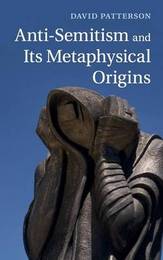
|
Anti-Semitism and its Metaphysical Origins
Hardback
Main Details
| Title |
Anti-Semitism and its Metaphysical Origins
|
| Authors and Contributors |
By (author) David Patterson
|
| Physical Properties |
| Format:Hardback | | Pages:334 | | Dimensions(mm): Height 229,Width 152 |
|
| Category/Genre | Philosophy of religion
Theology |
|---|
| ISBN/Barcode |
9781107040748
|
| Classifications | Dewey:305.8924 |
|---|
| Audience | | Professional & Vocational | |
|---|
|
Publishing Details |
| Publisher |
Cambridge University Press
|
| Imprint |
Cambridge University Press
|
| Publication Date |
9 February 2015 |
| Publication Country |
United Kingdom
|
Description
This book articulates a deeper understanding of the phenomenon of Jew hatred as a metaphysical aspect of the human soul. Proceeding from the Jewish thinking that the anti-Semites oppose, David Patterson argues that anti-Semitism arises from the most ancient of temptations, the temptation to be as God, and thus to flee from an absolute accountability to and for the other human being.
Author Biography
David Patterson holds the Hillel Feinberg Chair in Holocaust Studies at the Ackerman Center for Holocaust Studies at the University of Texas, Dallas. A winner of the National Jewish Book Award and the Koret Jewish Book Award, he has published more than thirty books and 150 articles and book chapters. His most recent books include Genocide in Jewish Thought (Cambridge, 2012), A Genealogy of Evil: Anti-Semitism from Nazism to Islamic Jihad (Cambridge, 2010), Emil L. Fackenheim: A Jewish Philosopher's Response to the Holocaust (2008), Open Wounds: The Crisis of Jewish Thought in the Aftermath of Auschwitz (2006), Wrestling with the Angel (2006), Along the Edge of Annihilation (1999), and Sun Turned to Darkness (1998). He is the editor and translator of The Complete Black Book of Russian Jewry (2002) and the co-editor of the Encyclopedia of Holocaust Literature (with Alan L. Berger, 2002).
Reviews'David Patterson's remarkable book offers a new method for a provocative evaluation of anti-Semitism. It uses a 'Jewish approach to understanding Jew hatred' and sees the roots of this hatred springing from ancient, metaphysical origins. Analyzing the human ambition for unlimited power, it argues that longing to kill God drives the desire to kill the Jews. Incisive, lucid and extremely well researched, this work opens up new questions and gives new answers to the urgent issue of the hatred of the Jews.' Zsuzsanna Ozsvath, Leah and Paul Lewis Chair of Holocaust Studies, Ackerman Center for Holocaust Studies, University of Texas, Dallas 'David Patterson transforms the proposition of the first theological conversation in Genesis: 'You will be like God' into his hermeneutical instrument to explore the metaphysical origins of anti-Semitism and what drives this scourge of humankind's history. His extensive acquaintance with ancient, medieval, modern and postmodern Jewish and non-Jewish sources grounds and elaborates his thesis that anti-Semitism is the manifestation par excellence of deicide. This is a fascinating, intriguing and evocative study truly worthy of our serious engagement.' Martin Rumscheidt, College of Arts and Sciences, Case Western Reserve University 'Anti-Semitism and its Metaphysical Origins is a relentless investigation into this dangerous phenomenon. With broad erudition and systematic analysis, it surely makes us better-informed students. But the book does more than that. With fiercely energetic prose, David Patterson teaches us about anti-Semitism from a God-centered vantage point. To this end, he recruits gems of Torah to provoke a sea change in our thinking about the subject - and about ourselves.' Alan Rosen 'Daring, brilliant, comprehensive, challenging, disturbing - those words describe David Patterson's magisterial interpretation of anti-Semitism. From now on, no attempts to understand and resist anti-Semitism will be sound unless they grapple with Patterson's provocative thesis: Anti-Semitism originates in humanity's craving to be rid of God and ethical obligation. That deadly temptation ultimately entails destruction of Jewish life and tradition, the most enduring and persistent sources that bear witness to the living God of Abraham, Isaac and Jacob, the divine commandment against murder, and the injunction to love one's neighbor as oneself.' John K. Roth, Edward J. Sexton Professor Emeritus of Philosophy, Claremont McKenna College
|